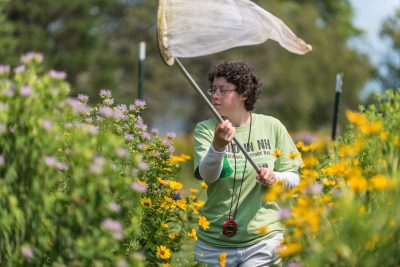 Molly Jacobson, a recent graduate of UNH’s undergraduate wildlife and conservation biology program, was one of four researchers who studied the status of the state’s bumble bee population. Credit: Jeremy Gasowski/UNH
Molly Jacobson, a recent graduate of UNH’s undergraduate wildlife and conservation biology program, was one of four researchers who studied the status of the state’s bumble bee population. Credit: Jeremy Gasowski/UNH
DURHAM, N.H. – In the first long-term study of New Hampshire’s bumble bee population, researchers with the New Hampshire Agricultural Experiment Station at the University of New Hampshire have found three of the state’s most important bumble bee species have experienced drastic declines and range constriction over the last 150 years, with a fourth bee also in significant decline.
The research was conducted by Sandra Rehan, assistant professor of biological sciences at the University of New Hampshire; Erika Tucker, USDA research fellow and a postdoctoral researcher with the experiment station; Minna Mathiasson, a graduate student in biology; and Molly Jacobson, a recent graduate of UNH’s undergraduate wildlife and conservation biology program. The research results are part of the experiment station-funded project Sustainable Solutions to Problems Affecting Bee Health and are presented in Decline of bumble bees in northeastern North America, with special focus on Bombus terricola in the journal Biological Conservation.
“Wild bees, particularly bumble bees, are highly important pollinators for both agriculture and unmanaged ecosystems. They have experienced alarming declines in recent decades, and in order to effectively work towards their protection, information about their life histories, ecological roles, and distributional changes on a more local scale is needed,” according to Rehan and her colleagues.
The value of pollination to agriculture is estimated at more than $200 billion a year worldwide. The abundance of and diversity of pollinators are declining in many agricultural landscapes across the United States. Given this importance, widespread declines in pollinator diversity have led to concern about a global pollinator crisis. The National Research Council has called for regional, national, and international monitoring programs to allow tracking the status and trends of pollinators.
To conduct their research, scientists analyzed 3,333 bumble bee specimens comprising 16 Bombus species dating to 1867. Bombus specimens for this study were made available from the UNH Insect Collection, as well as from field collections performed by the Rehan lab during summers of 2014–2016. This allowed researchers to track over time changes in abundance and distribution, with focus on species designated of greatest conservation need by N.H. Department of Fish and Game. Floral records also provided insight into the diet breadth of these species, which may affect their vulnerability.
Scientists found drastic decline in Rusty patch bumble bees (Bombus affinis),golden northern bumble bees (Bombus fervidus), and yellow banded bumble bees (Bombus terricola), as well as significant decline in half-black bumblebees (Bombus vagans), with data suggesting it has been ecologically replaced by Bombus impatiens over time. The rusty patch bumble bee, Bombus affinis, was the first bee listed as an endangered species in the continental United States earlier this year. This species is thought to be locally extinct in New Hampshire as was last collected in 1993. Among other species of greatest conservation need, Bombus fervidus has declined by 96 percent over the past 150 years, and Bombus terricola has declined by 71 percent. Bombus vagans has also experienced a significant decline of 42 percent in New Hampshire. The researchers suggest Bombus vagans receive future conservation consideration.
Their analyses also found a severe constriction of the geographic range of Bombus terricola to high elevation regions in the latter half of the 20th century, and its role as pollinator of several alpine plants necessitates immediate conservation action.
The study adds critical floral associations and demographic data for New England bumble bees and those undergoing national decline, to better inform management decisions and conservation efforts going into the future.
“Climate and land use change may be playing significant roles in the losses of northeastern
bumble bees, with many effects still unknown with continued alterations to precipitation patterns, temperature, phenology and availability of native flora. Studies on bumble bee declines are time-sensitive and crucial to understanding how wild bees are being affected by anthropogenic changes to the planet. These data are needed so that we may prevent vulnerable pollinators from going extinct with far-reaching ramifications within ecosystems,” the researchers said.
More information on the native bees of New Hampshire can be found on the bee lab’s educational website. This material is based upon work supported by the NH Agricultural Experiment Station, through joint funding of the National Institute of Food and Agriculture, U.S. Department of Agriculture, under award number 1004515, and the state of New Hampshire. The research also is supported by the UNH Hamel Center for Undergraduate Research.
Founded in 1887, the NH Agricultural Experiment Station at the UNH College of Life Sciences and Agriculture is UNH’s original research center and an elemental component of New Hampshire’s land-grant university heritage and mission. We steward federal and state funding, including support from the USDA National Institute of Food and Agriculture, to provide unbiased and objective research concerning diverse aspects of sustainable agriculture and foods, aquaculture, forest management, and related wildlife, natural resources and rural community topics. We maintain the Woodman and Kingman agronomy and horticultural research farms, the Macfarlane Research Greenhouses, the Fairchild Dairy Teaching and Research Center, and the Organic Dairy Research Farm. Additional properties also provide forage, forests and woodlands in direct support to research, teaching, and outreach.
The University of New Hampshire is a flagship research university that inspires innovation and transforms lives in our state, nation and world. More than 16,000 students from all 50 states and 71 countries engage with an award-winning faculty in top ranked programs in business, engineering, law, liberal arts and the sciences across more than 200 programs of study. UNH’s research portfolio includes partnerships with NASA, NOAA, NSF and NIH, receiving more than $100 million in competitive external funding every year to further explore and define the frontiers of land, sea and space.
Story submitted by UNH Media Relations


 Molly Jacobson, a recent graduate of UNH’s undergraduate wildlife and conservation biology program, was one of four researchers who studied the status of the state’s bumble bee population. Credit: Jeremy Gasowski/UNH
Molly Jacobson, a recent graduate of UNH’s undergraduate wildlife and conservation biology program, was one of four researchers who studied the status of the state’s bumble bee population. Credit: Jeremy Gasowski/UNH

 One of the dogs seized from Christina Fay’s Wolfeboro mansion in June ~ Photo by Meredith Lee/The HSUS
One of the dogs seized from Christina Fay’s Wolfeboro mansion in June ~ Photo by Meredith Lee/The HSUS 32-year-old Scott Sanborn of Wolfeboro was arrested after leading Police on a chase Monday ~ Photo Courtesy of Wolfeboro Police
32-year-old Scott Sanborn of Wolfeboro was arrested after leading Police on a chase Monday ~ Photo Courtesy of Wolfeboro Police The vehicle the suspect allegedly fled in an attempt to evade Wolfeboro Police before later being arrested ~ Photo Courtesy of Wolfeboro Police
The vehicle the suspect allegedly fled in an attempt to evade Wolfeboro Police before later being arrested ~ Photo Courtesy of Wolfeboro Police
